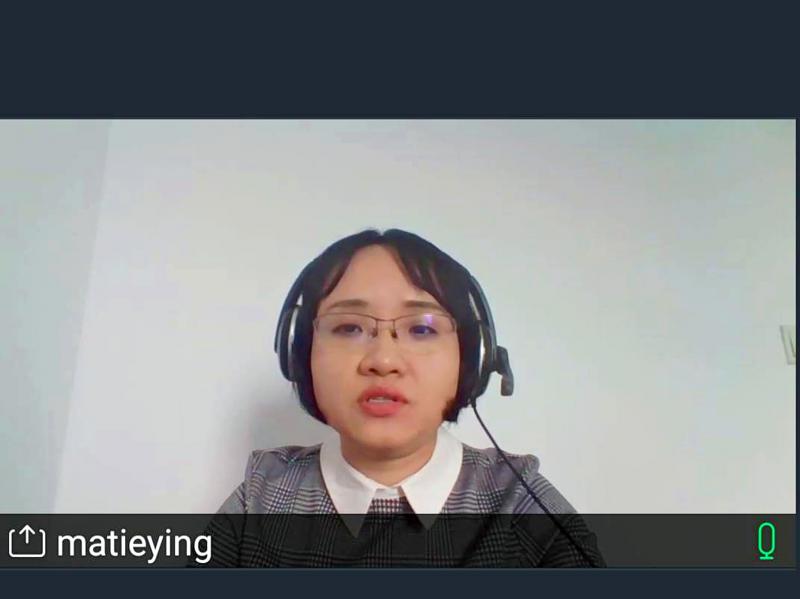DBS Bank Ltd yesterday revised upward its GDP growth forecast for Taiwan to 5.5 percent this year, from the 5 percent it predicted in April, citing better-than-expected investments.
Imported capital goods advanced 63.5 percent in August, indicating that local manufacturers, especially those in the semiconductor industry, increased their investments, Singapore-based DBS economist Ma Tieying (馬鐵英) told a videoconference.
Data for last month had not been released, but the momentum in July and August should have remained intact last month, Ma said.

Photo: Lee Chin-hui, Taipei Times
“With annual growth of 7.4 percent, Taiwan’s economy in the second quarter was brisker than expected,” she said.
“We also boosted our forecast for the third quarter to 4 percent, from 3.8 percent predicted in April, due to strong investment and recovering consumption in July and August,” she added.
However, the bank slashed its growth estimate for the fourth quarter from 3 percent to 1.8 percent, as export growth might slow to a single-digit rate compared with an annul rise of 31 percent in the first eight months of this year, Ma said.
“Exports will likely face headwinds, as demand from China could decline due to the country’s power rationing, which would limit production of Chinese electronics companies,” she said. “China is the largest market in terms of exports of intermediate electronics from Taiwan.”
Taiwan’s exports to China, including Hong Kong, have increased at declining rates for five months in a row, from 35 percent annual growth in March to 16 percent in August, she said.
Taiwan’s exports to Southeast Asia also slowed last month, with nations in the region reporting COVID-19 outbreaks that interrupted production and reduced import demand, Ma said.
“These negative factors have not fully been reflected on Taiwan’s economy and might become more obvious in the fourth quarter,” Ma said. “In an even worse scenario, these factors could continue existing and slowing the local economy in the first quarter next year.”
DBS Bank’s 5.5 percent growth forecast is lower than the 5.88 percent predicted by the Directorate-General of Budget, Accounting and Statistics (DGBAS).
The bank predicted 2.8 percent growth next year, also lower than the DGBAS’ 3.69 percent projection.
The central bank would stay put this quarter, as the labor market has not improved much, Ma said.
However, it might raise its policy rates in the second quarter of next year at the earliest, if employment improves, she said.

South Korea’s equity benchmark yesterday crossed a new milestone just a month after surpassing the once-unthinkable 5,000 mark as surging global memory demand powers the country’s biggest chipmakers. The KOSPI advanced as much as 2.6 percent to a record 6,123, with Samsung Electronics Co and SK Hynix Inc each gaining more than 2 percent. With the benchmark now up 45 percent this year, South Korea’s stock market capitalization has also moved past France’s, following last month’s overtaking of Germany’s. Long overlooked by foreign funds, despite being undervalued, South Korean stocks have now emerged as clear winners in the global market. The so-called “artificial intelligence

NEW IDENTITY: Known for its software, India has expanded into hardware, with its semiconductor industry growing from US$38bn in 2023 to US$45bn to US$50bn India on Saturday inaugurated its first semiconductor assembly and test facility, a milestone in the government’s push to reduce dependence on foreign chipmakers and stake a claim in a sector dominated by China. Indian Prime Minister Narendra Modi opened US firm Micron Technology Inc’s semiconductor assembly, test and packaging unit in his home state of Gujarat, hailing the “dawn of a new era” for India’s technology ambitions. “When young Indians look back in the future, they will see this decade as the turning point in our tech future,” Modi told the event, which was broadcast on his YouTube channel. The plant would convert

‘SEISMIC SHIFT’: The researcher forecast there would be about 1.1 billion mobile shipments this year, down from 1.26 billion the prior year and erasing years of gains The global smartphone market is expected to contract 12.9 percent this year due to the unprecedented memorychip shortage, marking “a crisis like no other,” researcher International Data Corp (IDC) said. The new forecast, a dramatic revision down from earlier estimates, gives the latest accounting of the ongoing memory crunch that is affecting every corner of the electronics industry. The demand for advanced memory to power artificial intelligence (AI) tasks has drained global supply until well into next year and jeopardizes the business model of many smartphone makers. IDC forecast about 1.1 billion mobile shipments this year, down from 1.26 billion the prior

People stand in a Pokemon store in Tokyo on Thursday. One of the world highest-grossing franchises is celebrated its 30th anniversary yesterday.